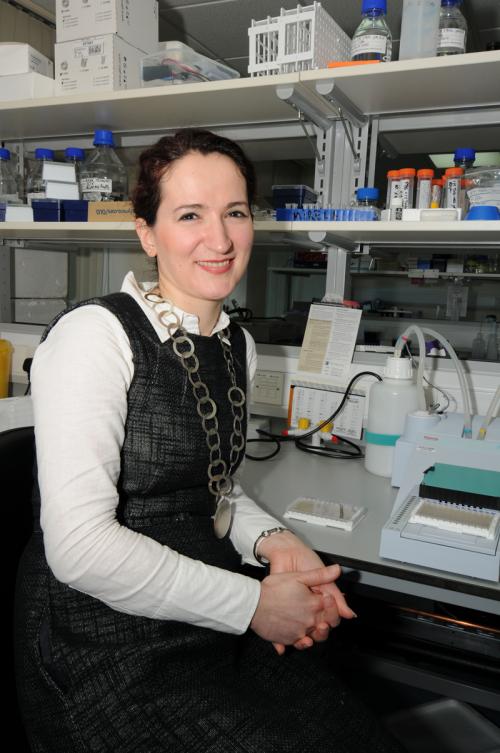
Former PhD student in the MRC PPU promoted to Professor
Congratulations to Mirela Delibegovic, a PhD student in Tricia Cohen's laboratory from 1999 to 2003, on her recent promotion to Professor in the School of Biological Sciences, University of Aberdeen, UK! Mirela, a lively member of the MRC PPU 15 years ago, has a long-standing interest in research related to the causes and possible treatments for Type II Diabetes. Her PhD studies focussed on the hormonal control of glycogen metabolism, and by employing gene ‘knockout' technology she showed that one form of glycogen-targeted protein phosphatase 1 has the potential to contribute to obesity, glucose intolerance and insulin resistance in later life, and that a novel form of glycogen-targeted protein phosphatase 1 was regulated by insulin. Before leaving Dundee, Mirela married another member of the MRC PPU Nimesh Mody who also was awarded his PhD in 2003.
Mirela was appointed as a postdoctoral scientist with Professor Benjamin Neel at the Harvard Medical School in Boston, USA, where she continued research in the field of diabetes investigating protein tyrosine phosphatase1B in peripheral and hypothalamic metabolic signalling pathways, supporting its potential as a good target for the treatment of Type II Diabetes. In 2007 Mirela moved to the University of Aberdeen and was awarded a group leader fellowship from Research Councils UK for investigation into molecular aspects of ageing and obesity in animal models and later many other grants. Her studies have focussed mainly on tissue specific models of protein 1B and provided excellent data on the role of protein tyrosine phosphatase 1B in metabolic changes, such as obesity, cardiovascular disease, and inflammation, supporting the notion that inhibition of PTP1B may be beneficial in these disorders, sometimes associated with Type II Diabetes.
On being asked how she managed all her research with two young children, Mirela replied 'I have to say I couldn't have done it all without Nimesh... I was a partner in a big EU project so I've had to be away a lot and he's been holding the fort!'
Mirela was appointed as a postdoctoral scientist with Professor Benjamin Neel at the Harvard Medical School in Boston, USA, where she continued research in the field of diabetes investigating protein tyrosine phosphatase1B in peripheral and hypothalamic metabolic signalling pathways, supporting its potential as a good target for the treatment of Type II Diabetes. In 2007 Mirela moved to the University of Aberdeen and was awarded a group leader fellowship from Research Councils UK for investigation into molecular aspects of ageing and obesity in animal models and later many other grants. Her studies have focussed mainly on tissue specific models of protein 1B and provided excellent data on the role of protein tyrosine phosphatase 1B in metabolic changes, such as obesity, cardiovascular disease, and inflammation, supporting the notion that inhibition of PTP1B may be beneficial in these disorders, sometimes associated with Type II Diabetes.
On being asked how she managed all her research with two young children, Mirela replied 'I have to say I couldn't have done it all without Nimesh... I was a partner in a big EU project so I've had to be away a lot and he's been holding the fort!'

